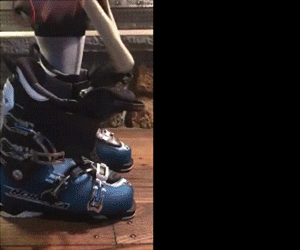Fighting gritty catchy kneecaps and all kinds of tight soft tissues at the moment
Check with your doc/PT of course - but I dealt with a lot of this, and there are some very specific things that help.
At the PT : Find someone who can do Graston technique. Hurts like a b**** but it breaks up all sorts of tight tissue.
For yourself:
Mobilize your kneecap. This is something that squicked me out at first, but I had to learn. Push the kneecap around - side to side, up and down. Also hoooooold it for a minute to each direction, rather than wiggling it around.
Foam roller. The really firm one - from what I've seen the firm ones are always black, the softer ones white - don't ask me why. There's a quad muscle running along the outside of your quad, kind of "3 o'clock" if the kneecap is "12 o'clock." That's the one I need to roll the crap out of. It gets super tight from compensation.
You can try the foam roller for the hamstring and calf, but for me the magic is with a lacrosse ball. I put it under the meaty part of my calf or under my hamstring and roll my body around on it until I find something owie. Then gently roll back and forth an inch or two just as you would a foam roller.
Stretches. Calf stretches. Hamstring stretches. There are a million variants; find the ones that work for you. Hold for 30s to a minute each.
Quad stretches - not sure if you can do this yet or should, though.
Extension! I bought sandbag weights (the kind designed for extra resistance while walking around) and would prop my foot up on something so that my knee was unsupported, and eventually worked up to ten pounds of weight for 15 minutes. When I started, I could barely do 3 minutes without extra weight.
Hip strength is critical. Things like clamshells; frog walk with resistance; one leg deadlifts / "superman" ...
https://betterbuttchallenge.com/best-butt-exercises-clamshells/ - you don't need to use resistance at first - but you need to focus on the muscle being used. When I started, I was using parts of my quad, not my glutes. You should feel it in the middle of your buttcheek - where the dimple is, roughly.
https://www.popsugar.com/fitness/photo-gallery/28185620/image/28185661/Lateral-Band-Walks - I put the band around my ankles, not my knees. If you don't feel the glutes, try getting lower (without tipping your body forward) or try angling your feet outward.
- but go as far as you can toward your body being parallel to the ground.
For all of these exercises, focus on feeling it in your glutes. If you don't feel it in your glutes, you're not getting the benefit. My PT recently pointed out that some of my knee pain is because I'm allowing my femur to rotate inward, causing grinding against my knee. If my hip were stronger, I wouldn't be rotating.
Again though, I am not a doctor or a PT and I have no idea if these exercises are appropriate to your current state.


